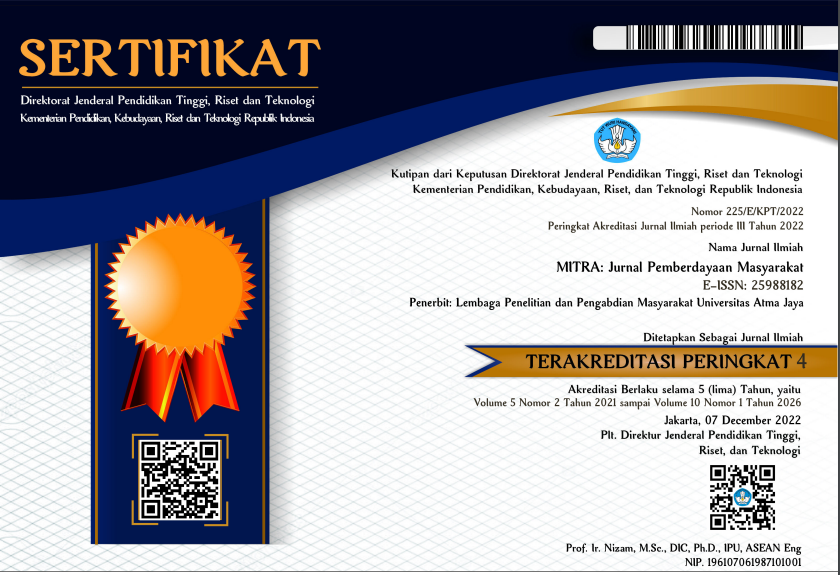Psychological Guidance for Independent Adolescents Program in PSAA Ceger and Tebet, Jakarta
DOI:
https://doi.org/10.25170/mitra.v3i2.346Keywords:
independence, child care social care institutions, psychological assistance, adolescentsAbstract
Ceger and Tebet Childcare Social Institution (PSAA) is the Technical Service Unit of the DKI Jakarta Provincial Social Service that provides services for adolescents at junior and senior high school levels. As a social care institution, it is undeniable that fulfilling psychological needs is just as important as fulfilling physical needs. Various problems that arise in foster children are usually concerned with lack of fulfillment of psychological needs. When an individual reaches the adolescent phase, the need for psychological fulfillment changes. In the adolescent phase, independence is one of the main development tasks that need to be mastered, so the focus of assistance in 2018 was directed to preparation for orphanage youths in facing life after the orphanage, which will begin after they graduate from high school. The present community service activity aims to provide psychological assistance for children of PSAA Putra Utama 3 Tebet and Putra Utama 4 Ceger Jakarta to help them become independent and to be ready to face life after high school, with an understanding of how to effectively manage themselves and manage others in personal and professional situations. Through this program, participants were expected to be able to learn the following skills: be independent and ready to work, manage themselves, and manage others. The community mentoring training module was designed based on the typical characteristics of participants fromm PSAA Putra Utama 3 Tebet and 4 Ceger during the 11 month assistance period. It can also be used by the PSAA to run training-based mentoring intervention programs independently in the future.
References
Bandura, A., Barbaranelli, C., Caprara, G., & Pastorelli, C. (2001). Self-efficacy beliefs as shapers of children's aspirations and career trajectories. Child Development, 72(1), 187-206. http://dx.doi.org/10.1111/1467-8624.00273.
Borualogo, I. S. (2004). Hubungan antara persepsi tentang figur attchment dengan self esteem remaja Panti Asuhan Muhammadiyah. Jurnal Psikologi, 13, 29-49.
Handayani, P., & Azura, A. (2018). Program pendampingan psikologis bagi remaja
PSAA Ceger dan Tebet, Jakarta: Analisis kebutuhan. MITRA: Jurnal Pemberdayaan Masyarakat, 2(1), 26—40.
Santrock, J. W. (2003). Adolescence perkembangan remaja. Alih Bahasa Shinto & Sherly. Jakarta: Erlangga.
Santrock, J.W. (2011). Educational psychology (5th ed.). New York: McGraw-Hill.
Santrock, J.W. (2012). Adolescence. New York: McGraw-Hill Education.
Santrock, J.W. (2014). Adolescence (15th ed). New York: McGraw-Hill Education.
Zimmerman, B., Bandura, A., & Martinez-Pons, M. (1992). Self-motivation for academic attainment: The role of self-efficacy beliefs and personal goal setting. American Educational Research Journal, 29(3), 663-676. http://dx.doi.org/10.3102/00028312029003663.
Downloads
Published
How to Cite
Issue
Section
License
This license allows reusers to distribute, remix, adapt, and build upon the material in any medium or format for noncommercial purposes only, and only so long as attribution is given to the creator. If you remix, adapt, or build upon the material, you must license the modified material under identical terms.







_.jpeg)




.png)
2.png)
.png)
.png)



